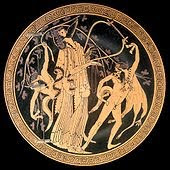
According to Classical-era mythology, after the overthrow of the Titans, the new pantheon of gods and goddesses was confirmed. Among the principal Greek gods were the Olympians, residing atop Mount Olympus under the eye of Zeus. (The limitation of their number to twelve seems to have been a comparatively modern idea). Besides the Olympians, the Greeks worshipped various gods of the countryside, the goat-god Pan, Nymphs (spirits of rivers), Naiads (who dwelled in springs), Dryads (who were spirits of the trees), Nereids (who inhabited the sea), river gods, Satyrs, and others. In addition, there were the dark powers of the underworld, such as the Erinyes (or Furies), said to pursue those guilty of crimes against blood-relatives. In order to honor the Ancient Greek pantheon, poets composed the Homeric Hymns (a group of thirty-three songs). Gregory Nagy regards "the larger Homeric Hymns as simple preludes (compared with Theogony), each of which invokes one god".
In the wide variety of myths and legends that Greek mythology consists of, the gods that were native to the Greek peoples are described as having essentially corporeal but ideal bodies. According to Walter Burkert, the defining characteristic of Greek anthropomorphism is that "the Greek gods are persons, not abstractions, ideas or concepts". Regardless of their underlying forms, the Ancient Greek gods have many fantastic abilities; most significantly, the gods are not affected by disease, and can be wounded only under highly unusual circumstances. The Greeks considered immortality as the distinctive characteristic of their gods; this immortality, as well as unfading youth, was insured by the constant use of nectar and ambrosia, by which the divine blood was renewed in their veins.

Each god descends from his or her own genealogy, pursues differing interests, has a certain area of expertise, and is governed by a unique personality; however, these descriptions arise from a multiplicity of archaic local variants, which do not always agree with one another. When these gods are called upon in poetry, prayer or cult, they are referred to by a combination of their name and epithets, that identify them by these distinctions from other manifestations of themselves (e.g. Apollo Musagetes is "Apollo, [as] leader of the Muses"). Alternatively the epithet may identify a particular and localized aspect of the god, sometimes thought to be already ancient during the classical epoch of Greece.
Most gods were associated with specific aspects of life. For example, Aphrodite was the goddess of love and beauty, Ares was the god of war, Hades the god of the dead, and Athena the goddess of wisdom and courage. Some gods, such as Apollo and Dionysus, revealed complex personalities and mixtures of functions, while others, such as Hestia (literally "hearth") and Helios (literally "sun"), were little more than personifications. The most impressive temples tended to be dedicated to a limited number of gods, who were the focus of large pan-Hellenic cults. It was, however, common for individual regions and villages to devote their own cults to minor gods. Many cities also honored the more well-known gods with unusual local rites and associated strange myths with them that were unknown elsewhere. During the heroic age, the cult of heroes (or demi-gods) supplemented that of the gods.

Nema komentara:
Objavi komentar